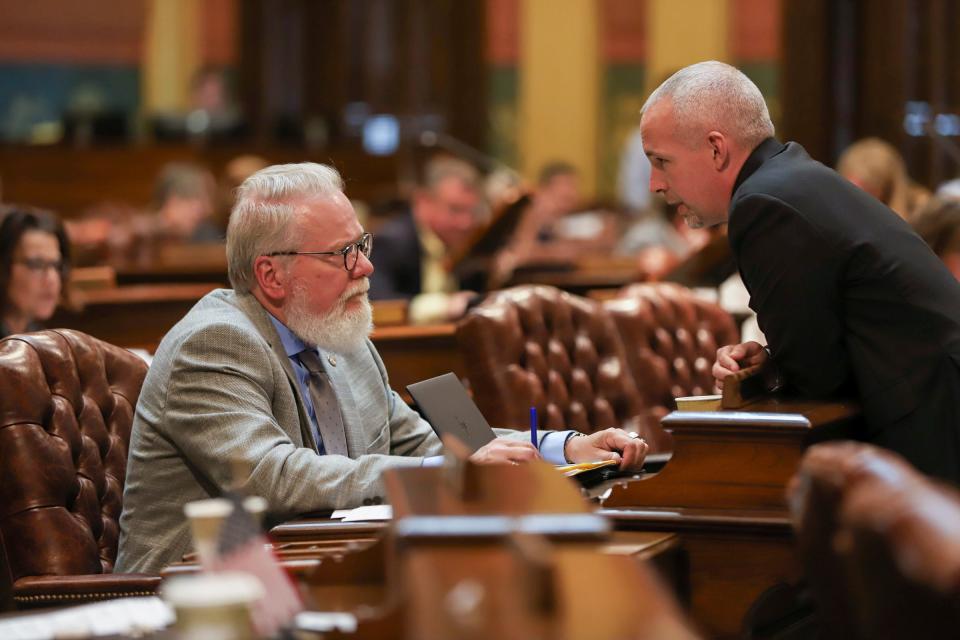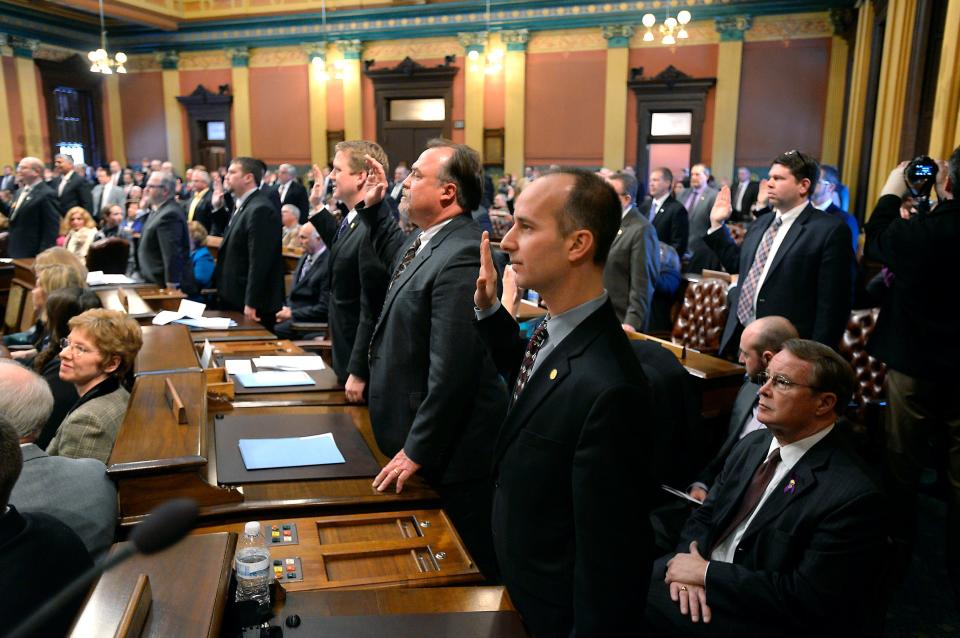Michigan's Proposal 1 would change term limits, require financial disclosure for lawmakers
Michigan voters will have a chance to decide this fall whether they want to ditch the current term limits for state lawmakers in favor of reducing the total number of years lawmakers can serve in Lansing while increasing the number of times they can seek reelection in either chamber.
The proposal would also establish new financial disclosure requirements for some elected officeholders.
Under the current term limits adopted by voters in 1992, state representatives can serve three two-year terms while state senators can serve two four-year terms. That allows a state lawmaker to serve in the state Legislature for a total of 14 years: six in the state House and eight in the state Senate.

If adopted by voters, Proposal 1 would reduce the number of years a state lawmaker could serve in the state Legislature from 14 to 12 years. But it would enable state lawmakers to serve all 12 of those years in one chamber: allowing state representatives to serve a maximum of six two-year terms and state senators to serve up to three four-year terms. In other words, it would double the time lawmakers can spend in the state House or allow an additional term in the state Senate.
Proposal 1 would also create new financial disclosure requirements for the governor, lieutenant governor, secretary of state, attorney general and state legislators. It would require annual reports describing their assets and sources of income, positions held outside of state government, agreements or arrangements regarding future employment, gifts and travel payments received among other requirements. If voters adopt Proposal 1 this fall, the amendment would require legislation to implement the financial disclosure requirements, which kick in starting in 2024.
More:Ballot drive seeks financial disclosure, term limit changes for Michigan lawmakers
More:Michigan voters to decide on changes to term limits, new financial disclosures
Why do Proposal 1 supporters want to modify the current term limits for state lawmakers and require financial disclosures?
"Thirty years ago, I voted for term limits. I would oppose any effort to repeal term limits," said Rich Studley, the former president and CEO of the Michigan Chamber of Commerce who serves as one of the co-chairs for Voters for Transparency and Term Limits, the group championing the amendment.
But he said that Michigan's strictest-in-the-nation term limits have had "unintended consequences," in particular in the state House where he said many view the lower chamber as a "stepping stone" for higher office.
"It's sort of an endless merry-go-round now with people moving from one office to another," Studley said.
Proposal 1 would allow lawmakers "to gain enough experience so that we can slow the revolving door, especially in the state House, so that politicians can focus on the job they have instead of constantly raising funds to prepare for the next election and seek higher office," he said.
Voters for Transparency and Term Limits has also billed the proposed financial disclosure as a way to expose conflicts of interest. Michigan ranked last in a Center for Public Integrity analysis of procedures in place to limit corruption. It is one of two states that don't require lawmakers to disclose their finances.
Studley said that without any financial disclosure requirements in place, it is impossible to know whether any state lawmakers have a financial interest in the legislation they craft and approve.

How did Proposal 1 get on the ballot?
Earlier this year, a bipartisan coalition that included Studley, Detroit Mayor Mike Duggan, former GOP Michigan House Speaker Jase Bolger and former Michigan AFL-CIO President Mark Gaffney launched the ballot proposal drive.
While other proposals before voters this fall collected hundreds of thousands of signatures to qualify for the ballot, Proposal 1 landed a spot on the ballot when more than two-thirds of Michigan lawmakers approved a resolution to put the term limits and financial disclosure proposal to a statewide vote.

Why do opponents want to see Proposal 1 defeated?
Opponents argue lawmakers approved the measure for a statewide vote without any debate or discussion to extend their time in office. They predict the proposal would slow turnover in Lansing.
"The point of this proposal is to double the terms in the House and go from eight years to twelve years in the Senate," said Kurt O'Keefe, executive director of No More Time for Career Politicians, a group opposed to Proposal 1.
"Term limits forces turnover," he said. "There's just an incumbent advantage, we know it's there."
O'Keefe also said that the proposal would benefit lobbyists.
"Once a lobbyist has a relationship with a legislator... they want them in there as long as possible, they don't want them flipping around every six or eight years."
He also called the proposed financial disclosure requirement a "pseudo-disclosure" rife with "loopholes."
The ballot proposal approved by lawmakers weakened the financial disclosure requirements included in the original ballot proposal.
If adopted, Proposal 1 would require state lawmakers to pass legislation to implement the financial disclosure requirements. The constitutional amendment lays out that each member of the Legislature, the governor, the lieutenant governor, the secretary of state and the attorney general must file an annual report that must include the following:
"Description of assets and sources of unearned income."
"Sources of earned income."
"Description of liabilities."
"Positions currently held as an officer, director, trustee, partner, proprietor, representative, employee, or consultant of any organization, corporation, firm, partnership, or other business enterprise, nonprofit organization, labor organization, or educational or other institution other than the state of Michigan. The positions required to be disclosed... do not include positions held in any religious, social, fraternal, or political entity, or positions that are solely of an honorary nature."
"Agreements or arrangements with respect to future employment, a leave of absence while serving as a legislator or state officer, continuation, or deferral of payments by a former or current employer other than the state of Michigan, or continuing participation in an employee welfare or benefit plan maintained by a former employer."
"Gifts received and required to be reported by a lobbyist or lobbyist agent, as prescribed by state law."
"Travel payments and reimbursements received and required to be reported by a lobbyist or lobbyist agent, as prescribed by state law."
"Payments made by a lobbyist or lobbyist agent to a charity in lieu of honoraria."

If adopted, how would Proposal 1 affect current and former state lawmakers?
If adopted, the amendment would have an exemption for some current state lawmakers. It would allow state representatives about to complete their third term in the state House seeking election to the state Senate this year to run again for a second Senate term, even though that exceeds the 12-year limit.
If adopted, starting in 2024, the proposal would also allow former state lawmakers who have previously served three two-year in the state House to serve an additional three two-year terms in the House or one two-year term in the House followed by one four-year term in the Senate.
Who's funding the Proposal 1 campaign and the opposition?
According to the group's campaign finance filings, the largest contribution to Voters for Transparency and Term Limits comes from Rock Holdings Inc., the holding company owned by Dan Gilbert that provides mortgage lending services through its subsidiaries. Rock Holdings, Inc. gave the ballot committee $75,000 in June. Voters for Transparency and Term Limits also received a $50,000 contribution from MI Energy First − which has ties to DTE Energy − in addition to $50,000 contributions from DTP Enterprises, MITA Inc. and Realtors PAC II.
No More Time for Career Politicians − the opposition group − has reported just two contributions in total from individuals Daniel Rich and Joseph Rich who − through their trusts − gave $50,000 each. Two individuals with the same names have also contributed to Term Limits Action which is registered at the same address as their trusts. Term Limits Action campaigned against Democratic Senate candidates in 2018 and the pair also gave to the conservative Club for Growth Action, according to the Center for Media and Democracy.
Clara Hendrickson fact-checks Michigan issues and politics as a corps member with Report for America, an initiative of The GroundTruth Project. Make a tax-deductible contribution to support her work at bit.ly/freepRFA. Contact her at chendrickson@freepress.com or 313-296-5743. Follow her on Twitter @clarajanehen.
This article originally appeared on Detroit Free Press: Proposal 1 in Michigan: Here's everything it would change

